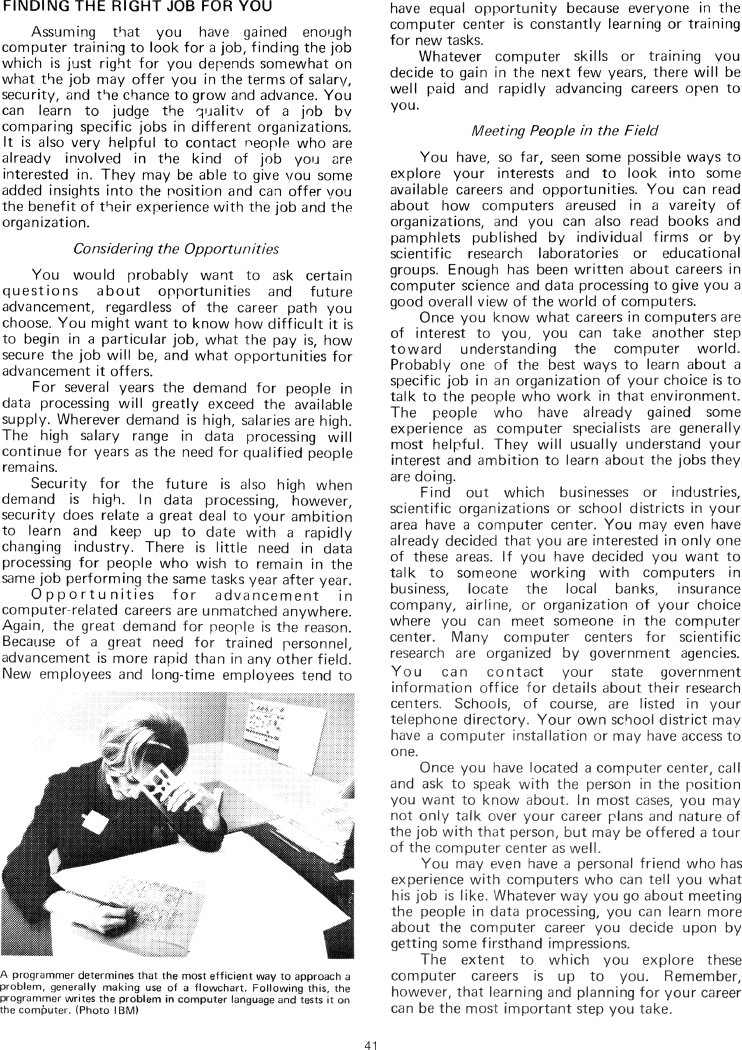The Best of Creative Computing Volume 1 (published 1976)
A Computer Career for You? (Finding the Right Job, Meeting People in the Field)

FINDING THE RIGHT JOB FOR YOU
Assuming that you have gained enough computer training to look for a job,
finding the job which is just right for you depends somewhat on what the job may
offer you in the terms of salary, security, and the chance to grow and advance.
You can learn to judge the quality of a job by comparing specific jobs in
different organizations. It is also very helpful to contact people who are
already involved in the kind of job you are interested in. They may be able to
give you some added insights into the position and can offer you the benefit of
their experience with the job and the organization.
Considering the Opportunities
You would probably want to ask certain questions about opportunities and future
advancement, regardless of the career path you choose. You might want to know
how difficult it is to begin in a particular job, what the pay is, how secure
the job will be, and what opportunities for advancement it offers.
For several years the demand for people in data processing will greatly exceed
the available supply. Wherever demand is high, salaries are high. The high
salary range in data processing will continue for years as the need for
qualified people remains.
Security for the future is also high when demand is high. In data processing,
however, security does relate a great deal to your ambition to learn and keep up
to date with a rapidly changing industry. There is little need in data
processing for people who wish to remain in the same job performing the same
tasks year after year.
Opportunities for advancement in computer-related careers are unmatched
anywhere. Again, the great demand for people is the reason. Because of a great
need for trained personnel, advancement is more rapid than in any other field.
New employees and long-time employees tend to
A programmer determines that the most efficient way to approach a problem,
generally making use of a flowchart. Following this, the programmer writes the
problem in computer language and tests it on the computer. (Photo IBM)
have equal opportunity because everyone in the computer center is constantly
learning or training for new tasks.
Whatever computer skills or training you decide to gain in the next few years,
there will be well paid and rapidly advancing careers open to you.
Meeting People in the Field
You have, so far, seen some possible ways to explore your interests and to look
into some available careers and opportunities. You can read about how computers
areused in a vareity of organizations, and you can also read books and pamphlets
published by individual firms or by scientific research laboratories or
educational groups. Enough has been written about careers in computer science
and data processing to give you a good overall view of the world of computers.
Once you know what careers in computers are of interest to you, you can take
another step toward understanding the computer world. Probably one of the best
ways to learn about a specific job in an organization of your choice is to talk
to the people who work in that environment. The people who have already gained
some experience as computer specialists are generally most helpful. They will
usually understand your interest and ambition to learn about the jobs they are
doing.
Find out which businesses or industries, scientific organizations or school
districts in your area have a computer center. You may even have already decided
that you are interested in only one of these areas. If you have decided you want
to talk to someone working with computers in business, locate the local banks,
insurance company, airline, or organization of your choice where you can meet
someone in the computer center. Many computer centers for scientific research
are organized by government agencies.
You can contact your state government information office for details about their
research centers. Schools, of course, are listed in your telephone directory.
Your own school district may have a computer installation or may have access to
one.
Once you have located a computer center, call and ask to speak with the person
in the position you want to know about. In most cases, you may not only talk
over your career plans and nature of the job with that person, but may be
offered a tour of the computer center as well.
You may even have a personal friend who has experience with computers who can
tell you what his job is like. Whatever way you go about meeting the people in
data processing, you can learn more about the computer career you decide upon by
getting some firsthand impressions.
The extent to which you explore these computer careers is up to you. Remember,
however, that learning and planning for your career can be the most important
step you take.
41


